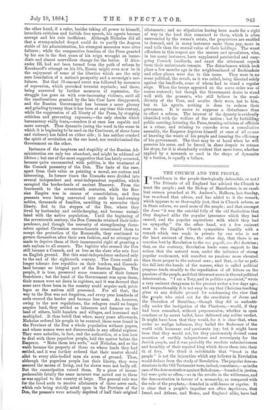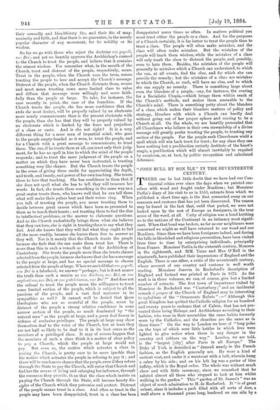THE CHURCH AND THE PEOPLE.
IS confidence in the people theologically defensible, or not ? The Primate of all England has advised the Church to trust the people ; and the Bishop of Manchester, in an excel- lent sermon preached at St. Andrew's, Holborn, last Sunday, has re-echoed that advice, and has added to it the remark, which appears to us thoroughly just, that in Church reform, as in State reform, we need more of the people ; and that amongst the Jews "it was the suicidal folly of the old Sanhedrin that they despised alike the popular ignorance which they had caused, and the popular aspirations with which they had no sympathy." On the other hand, not a few eminent men in the English Church sympathise heartily with a remark which was made in private by one who is not the least eminent of them, the other day, that there is no sanction lent by Revelation to the vox populi, vox Doi doctrine; that, on the contrary, Revelation lends some support to the notion that the natural man, under the influence of strong popular excitement, will manifest no passions more elevated than those proper to the natural man ; and that, so far as poli- tics fall into the hands of the masses, what is called political progress tends steadily to the repudiation of all fetters on the passions of the people, and that this must mean in the end political deterioration. " I am a Tory, and in politics a pessimist," wrote a very eminent clergyman to the present writer a few days ago; and unquestionably it is not easy to say that Christian teaching gives us any definite ground for condemning the view that the people who cried out for the crucifixion of Jesus and the liberation of Barabbas,—though they did so undoubt- edly under the instigation of the Pharisees,—would, if they had been consulted, without prepossession, whether in open conclave or by secret ballot, have delivered any nobler verdict. It might have been that they would, for it is clear that, when under no malign influence, they hailed the Redeemer of the world with hosannas and passionate joy ; but it might have been that they would not, for they passionately desired some assertion of earthly independence and sovereignty for the Jewish people, and it was probably the resolute submissiveness and humility of their reputed king which drove them into their fit of fury. We think it indubitable that "trust in the people " is not the injunction which any believer in Revelation would deduce from the study of Revelation. The popular demon- strations in the Old Testament were, indeed, sometimes,—as in the case of the demonstration against Rehoboam,—founded in justice, but were quite as often,—as in the revolts in the wilderness, and the demonstration in favour of a monarchy, as compared with the rule of the prophets,—founded in selfishness or caprice. It is clear that a people's impulses are often cepricions, that Israel, and Athens, and Rome, and England alike, have had
their cowardly and bloodthirsty fits, and their fits of mag- nanimity and faith, and that there is no guarantee, in the merely popular character of any movement, for its nobility or its wisdom.
So far we go with those who reject the doctrine vox populi, vox Dei ; and yet we heartily approve the Archbishop's counsel to the Church to trust the people, and believe that it contains the utmost wisdom. For remember what, in the mouth of the Church, trust and distrust of the people, respectively, mean. Trust in the people, when the Church uses the term, means trusting the people to love and accept the Church's message. Distrust of the people, when the Church distrusts them, means and must mean trusting some more limited class to value and diffuse that message more willingly and more faith- fully than the people at large. To take, for instance, the case recently in point, the case of the franchise. If the Church trusts the people, she has more confidence that the ends she most desires, will be properly valued by an electorate more nearly commensurate than is the present electorate with the people, than she has that they will be properly valued by an electorate which is limited by the fears and prejudices of a class or caste. And is she not right ? It is a very different thing for a mere man of impartial mind, who goes to the people empty-handed as it were, to trust the people, and for a Church with a great message to communicate, to trust them. The one, if he trusts them at all, can trust only their judg- ment, for he has no spell in him to which the mind of the people responds ; and to trust the mere judgment of the people on a matter on which they have never been instructed, is trusting something very like chance. But the Church trusts the people in the sense of giving them credit for appreciating the depth, and truth, and beauty, and power of her own teaching. She trusts them to love that teaching. She has confidence in them that if she does not spoil what she has to tell, they will treasure her words. In fact, she trusts them something in the same way as a great orator trusts them, who knows well that he can tell them what will make their pulses beat and their voices ring. When you talk of trusting the people, you mean trusting them to decide between great causes which have been so presented to them as to touch their hearts ; not trusting them to find the clue to intellectual problems, or the answer to elaborate questions. And as the Church undoubtedly brings them what she believes that they can love, she is right in trusting them to say what they feel. And she knows that they will feel what they ought to feel all the more readily, because she leaves them free to answer as they will. Nor is it merely that the Church trusts the people because she feels that she can make them trust her. There is more than this in such a remark as that of the Archbishop of Canterbury. She trusts the people more than she trusts classes selected from the people, because she knows that she has a message to the people at large, and has no special message to classes selected from the people at large. When we are told that vox populi, vox Dei is a falsehood, we answer " perhaps ; but is it not nearer the truth than such a maxim as vox divitum, vox Dei, or vox sapientium, vox Dei, or vox patriciorum, vox Dei ?" And does not the refusal to trust the people mean the willingness to trust some limited section of the people, which is subject to all the passions of the people, and a vast deal narrower in its sympathies as well ? It cannot well be denied that those theologians who are so scornful of the people, mean by distrust of the people a strong relative confidence in some narrow section of the people, as much dominated by " the natural man " as the people at large, and a great deal fiercer in defence of exclusive privileges. The people at large may show themselves deaf to the voice of the Church, but at least they are not half so likely to be deaf to it in its best sense as the members of a privileged class. It may of course happen that the members of such a class think it a matter of clear policy to pay a Church, which the people at large would not pay. But even so, the motive which actuates a class in paying the Church, is pretty sure to be more ignoble than the motive which actuates the people in refusing to pay it ; and there will be much more chance that the people, even if they refuse through the State to pay the Church, will enter that Church and find her the means of living and enlarging her influence, through the resources they provide, th an that the class which insists on paying the Church through the State, will become hearty dis- ciples of the Church which they patronise and protect. Distrust of the people means trust in a class. And often as trust in the people may have been disappointed, trust in a class has been
disappointed many times as often. In matters political you must trust either the people or a class. And for the purposes of a Church certainly, it is far better to trust the people than to trust a class. The people will often make mistakes, and the class will often make mistakes. But the mistakes of the people will teach them wisdom, while the mistakes of a class will only teach the class to distrust the people, and, possibly, even to hate them. Besides, the mistakes of the people will generally be mistakes which a Church can understand, to which she can, at all events, find the clue, and for which she can provide the remedy ; but the mistakes of a class are mistakes to which the Church, as such, will have no clue, and to which she can supply no remedy. There is something large about even the blunders of a people,—say, for instance, the craving for a Socialistic Utopia,—which brings them within reach of the Church's methods, and makes them amenable to the Church's mind. There is something petty about the blunders of a class, which makes their blunders matters of policy and strategy, blunders with which a Church can hardly deal without going out of her proper sphere and ceasing to be a Church at all. On the whole, we are heartily persuaded that all Churchmen who believe in their own stewardship of a divine message will greatly prefer trusting the people, to trusting any section of the people. For the people such Churchmen wield a spell which will win back trust for trust ; for any class they can have nothing but a predilection entirely destitute of the heart's magic, a predilection which will almost inevitably be requited by suspicion, or, at best, by politic recognition and calculated deference.



































 Previous page
Previous page